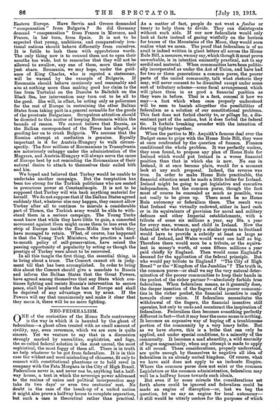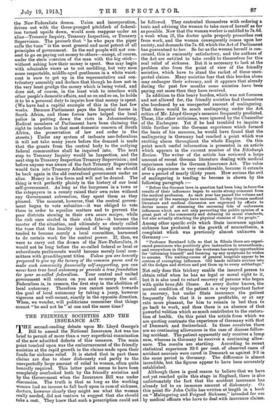NEO-FEDERALISM.
ONE of the curiosities of the Home Rule controversy is the way in which it is haunted by the ghost of federalism—a ghost often treated with no small amount of civility, nay, even reverence, which we are sure is quite sincere. Yet we venture to say that in a discussion strongly marked by unrealities, sophistries, and fogs, the so-called federal solution is the most unreal, the most sophistical, the most foggy of them all. There is in truth no help whatever to be got from federalism. It is in this case the wildest and most misleading of chimeras, fit only to consort with constitutional phantoms or to hold revel in company with the Fata Morgana in the City of High Brasil. Federalism never is, and never can be, anything but a half- way house, a tent in which the sovereign power addressed to the realms of union and political incorporation may take its two days' or even two centuries' rest. No doubt in the case of the break-up of a united nation it might also prove a halfway house to complete separation, but such a case is theoretical rather than practical. As a matter of fact, people do not want a foedus or treaty to help them to divide. They can disintegrate without such aids. If our new federalists would only look at facts instead of gazing wistfully on the horizon for traces of the Mountains of the Moon, they would soon realize what we mean. The proof that federalism is of no avail is indeed written in giant letters all across the Home Rule Bill, a measure, we may say, which though it must prove unworkable, is in intention eminently practical, not to say sordid and material. When communities have been politic.. ally incorporated as under the Act of Union, and have had for two or three generations a common purse, the poorer parts of the united community, talk what rhetoric they may, will never consent to be disunited except under some sort of tributary scheme—some fiscal arrangement which will !place them in as good a financial position as they were in before. That is a fact, conceal it how we may—a fact which when once properly understood will be seen to banish altogether the possibilities of federalism as a solution of our constitutional problems. This fact does not forbid charity to, or pillage by, a dis- sentient part of the nation, but it does forbid the federal tie. It forbids breaking asunder with the intention of drawing tighter together.
When the parties to Mr. Asquith's famous deal over the Budget came to grips with the Home Rule Bill, they were at once confronted by the question of finance. Finance conditioned the whole problem. It was perfectly useless, they soon found, to propose any plan of Home Rule for Ireland which would put Ireland in a worse financial position than that in which she is now. No one in Ireland, it at once became plain, would for a moment look at any such proposal. Indeed, the reverse was true. In order to make Home Rule practicable, the financial situation must be made a little better for Ireland. Ireland might be going to get legislative and executive independence, but the common purse, though the fact must of course be concealed as much as possible, was not really to be given up. There must be no Home Rule autonomy or federalism there. The result was that Ireland was virtually endowed, either in hard cash or in its equivalents of provision for naval and military defence and other Imperial establishments, with a tribute of some six millions a year, say 30s. a year for every man, woman, and child in Ireland. Now the federalist who wishes to apply a similar system to Scotland would have to provide a subsidy at least as large as that of Ireland, and Wales would want one half as big. Therefore there would soon be a tribute, or the equiva- lent in money's worth, of some fifteen millions a year paid chiefly by England. Then would come England's demand for the application of the federal principle. But who would pay tribute to England ? "The City of High Brasil" or the "Kingdom of the Jumblies"? The truth is the common purse—or shall we say the very natural deter- mination of the poorer communities to keep their hands in the pocket of the richer partner ?—absolutely forbids true federalism. When federalism means, as it generally does, the deeper insertion of the fingers of the poorer communi- ties in the richer pocket, the financial incentive is really towards closer union. If federalism necessitates the withdrawal of the fingers, the financial incentive still operates, but only to undo and counteract the inspiration of federalism. Federalism then becomes something perfectly different in fact—that it may bear the same name is nothing. It becomes an expensive way of buying off a troublesome portion of the community by a very heavy bribe. But as we have shown, this is a bribe that can only be applied, and under special conditions, to a minority of the community. It becomes a mad absurdity, a wild enormity of bogus magnanimity, when any attempt is made to apply it all round. These considerations, properly understood, are quite enough by themselves to negative all idea of federalism in an already united kingdom. Of course, what we have said does not apply to an inchoate Empire. Where the common purse does not exist or the common Legislature or the common administration, federalism may well be a halfway house towards such ideals.
But even if by some miracle the considerations set forth above could be ignored and federalism could be made an engine of disruption—or, lest we beg the question, let us say an engine for local autonomy— it still would be utterly useless for the purposes of which the New-Federalists dream. Union and incorporation, driven out with the three-pronged pitchfork of federal- ism turned upside down, would soon reappear under an alias—Treasury Inquiry, Treasury Inspection, or Treasury Supervision. The proverb that " he who pays the piper calls the tune " is the most general and most potent of all principles of government. In the end people will not con- sent to go on paying out money to others—except, of course, under the stern coercion of the man with the big stick— without asking how their money is spent. One may begin with admirable views as to not meddling, but very soon some respectable, middle-aged gentleman in a white waist- coat is sure to get up in the representative and con- tributory assembly and declare that though he does not in the very least grudge the money which is being voted, and does not, of course, in the least wish to interfere with other people's domestic affairs, and so on and so on, he holds it to be a personal duty to inquire how that money is spent. (We have had a capital example of this in the last few weeks. Because Parliament pays the Imperial forces in South Africa, and those forces have helped. the local police in putting down the riots in Johannesburg, Radical members of Parliament have been claiming the right to interfere in that most domestic concern of South Africa, the preservation of law and order in the streets.) Under any system of inchoate neo-federalism it will not take many years before the demand is made that the grants from the central body to the outlying federal communities shall be inquired into. The next step to Treasury Inquiry would be Inspection, and the next step to Treasury Inspection Treasury Supervision ; and before anyone was aware of the fact Treasury Supervision would turn into Treasury Administration, and we should be back again in the old centralized government under an alias. Money is a live force and will not be denied. The thing is writ perfectly plainly in the history of our local self-government. As long as the burgesses in a town or the ratepayers in a county raised their own rates without any Government subvention, they spent them as they pleased. The moment, however, that the central govern- ment began to vote subsidies—it was obliged to vote them in order to equalize matters and to prevent the poor districts stewing in their own sauce maigre, while the rich ones sizzled in their rich fats—it became the master of the situation, and ultimately so clearly called. the tune that the locality instead of being autonomous tended to become merely a local committee, harnessed. to do certain work for the central power. If, then, we were to carry out the dream of the New-Federalists, it would not be long before the so-called federal or local or subordinate parliaments would become merely local com- mittees with grandiloquent titles. Unless you are honestly prepared to give up the luxury of the common purse and to snake each community financially self-supporting, you can never have true local autonomy or provide a true foundation for your so-called federalism. Your central and united government will return on you and re-usurp the soil. Federalism is, in essence, the first step in the abolition of local autonomy. Therefore you cannot march towards the goal of local autonomy by taking a jump, however vigorous and well-meant, exactly in the opposite direction. When, we wonder, will politicians remember that things cannot " be and not be " at one and the same time ?











































 Previous page
Previous page